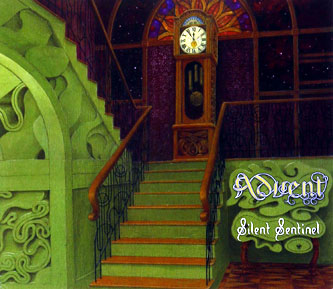 Based
in New Jersey, the progressive rock band called Advent recently
released their third CD called Silent Sentinel. The
79-minute album is a splendid testimony to Advent’s sweeping
progressive rock vision. Mixing a variety of inspirations, the band
recalls various prog legends such as early 1980s Yes, early 1970s
Gentle Giant and much more. The band’s core features Alan
Benjamin (guitars), Henry Ptak (keys/vocals), Mark Ptak
(keys/vocals), Greg Katona (guitars), Joe D’Andrea
(drums) and Brian Mooney (bass). Speaking to mwe3.com about
the beginnings of Advent, Alan Benjamin explains, “Although
Advent’s origins are over three decades old, we’ve only
had the opportunity to release three albums thus far, each approximately
nine years after the last—our self-titled debut (Mellow Records)
in 1997, followed by Cantus Firmus in 2006 and Silent Sentinel
in 2015. Our current lineup consists of Henry, Mark, and myself, along
with drummer Joe D’Andrea, who also sings very well and plays
violin in concert, and another guitarist/composer named Greg Katona—both
of whom are very established, long-term members that are truly integral
to what Advent has become.” The Silent Sentinel CD is superbly
recorded and the packaging includes all the lyrics to the music which
was mostly written by Henry Ptak, with the exception of a piece by
both Mark and Henry Ptak and several instrumentals composed by guitarists
Alan Benjamin and Greg Katona. The CD closes out with a mighty 12-minute
instrumental called “Romanitas” that was written by Henry
Ptak. So, as far as progressive music goes, there’s plenty of
variety throughout the album. With the 2015 CD release of Advent’s
Silent Sentinel, the spirit of U.K. progressive rock is alive and
well—and living in New Jersey. Progressive rock fans lucky enough
to hear this album will take notice of the impressive sonic vision
of Advent. www.adventmusic.net
Based
in New Jersey, the progressive rock band called Advent recently
released their third CD called Silent Sentinel. The
79-minute album is a splendid testimony to Advent’s sweeping
progressive rock vision. Mixing a variety of inspirations, the band
recalls various prog legends such as early 1980s Yes, early 1970s
Gentle Giant and much more. The band’s core features Alan
Benjamin (guitars), Henry Ptak (keys/vocals), Mark Ptak
(keys/vocals), Greg Katona (guitars), Joe D’Andrea
(drums) and Brian Mooney (bass). Speaking to mwe3.com about
the beginnings of Advent, Alan Benjamin explains, “Although
Advent’s origins are over three decades old, we’ve only
had the opportunity to release three albums thus far, each approximately
nine years after the last—our self-titled debut (Mellow Records)
in 1997, followed by Cantus Firmus in 2006 and Silent Sentinel
in 2015. Our current lineup consists of Henry, Mark, and myself, along
with drummer Joe D’Andrea, who also sings very well and plays
violin in concert, and another guitarist/composer named Greg Katona—both
of whom are very established, long-term members that are truly integral
to what Advent has become.” The Silent Sentinel CD is superbly
recorded and the packaging includes all the lyrics to the music which
was mostly written by Henry Ptak, with the exception of a piece by
both Mark and Henry Ptak and several instrumentals composed by guitarists
Alan Benjamin and Greg Katona. The CD closes out with a mighty 12-minute
instrumental called “Romanitas” that was written by Henry
Ptak. So, as far as progressive music goes, there’s plenty of
variety throughout the album. With the 2015 CD release of Advent’s
Silent Sentinel, the spirit of U.K. progressive rock is alive and
well—and living in New Jersey. Progressive rock fans lucky enough
to hear this album will take notice of the impressive sonic vision
of Advent. www.adventmusic.net
mwe3.com presents an interview with
Alan Benjamin of ADVENT
mwe3: Can you tell us where you live now and what you like best
about it? I know you’re from New Jersey originally, right? Tell
us about growing up in New Jersey and what other cities or countries
interest you?
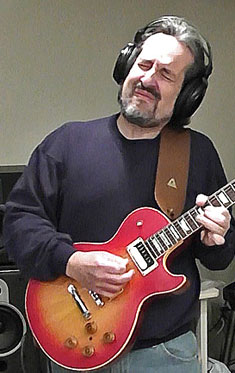 Alan
Benjamin: I was actually born and raised in NYC on the upper-east
side of Manhattan, but sent to boarding school outside of Philadelphia
at age 12, where I remained until graduating high school four years
later—and, after a semester at Berklee in Boston, and working
in the garment district back in NYC, I moved back down to the Philly
area for about six years or so at age 17. About three decades ago,
I relocated to New Jersey and have been living here ever since.
Alan
Benjamin: I was actually born and raised in NYC on the upper-east
side of Manhattan, but sent to boarding school outside of Philadelphia
at age 12, where I remained until graduating high school four years
later—and, after a semester at Berklee in Boston, and working
in the garment district back in NYC, I moved back down to the Philly
area for about six years or so at age 17. About three decades ago,
I relocated to New Jersey and have been living here ever since.
As for growing up, I found NYC a great place to get started with music,
having apparently begged my mom, who was a great pianist and songwriter
in her day and still plays quite proficiently, for piano lessons before
turning three and starting shortly after my birthday. From there,
I went on to play violin and, with the benefit of both a world-class
violin teacher and private-school orchestra conductor, was able to
develop remarkably quickly as a capable classical violinist. Being
sent to boarding school at 12, against my will, without being allowed
to bring my violin initially seemed like a major setback, but I quickly
made friends who turned me on to some great rock music. My second
roommate probably playing the most foundational role by constantly
playing Queen’s Sheer Heart Attack, Sweet’s Desolation
Boulevard, and Kimono My House by Sparks and ended up taking
up guitar very soon afterward. Being very motivated and progressing
rapidly on my new primary instrument, I soon formed a band at the
school while also getting into music of other artists like Rush, YES,
Genesis, and The Dixie Dregs.
There wasn’t much of an overt global focus to my interests at
the time, although I was always intrigued by other cultures I’d
see in movies and on TV shows. In fact, while I never really thought
about it before, becoming a huge fan of the original British TV show
The Avengers at a very young age probably ingrained a particular
affinity for the UK—something which has increased dramatically
since spending a little time there on several occasions. As an adult,
however, my interest in other countries and cultures has grown to
be practically limitless.
mwe3: When did Advent form, how did you meet each other and
how many albums have you released and who is in the current lineup
of the band?
Alan Benjamin: Advent cofounder (keyboardist/vocalist/composer)
Henry Ptak and I first connected in October of 1989, via an ad in
a local rock music/musician-focus magazine that was called The
East Coast Rocker at the time. This publication was originally
known as The Aquarian Weekly and has also reverted back to
this title, by the way. We initially met up at Henry’s place—and,
as soon as he put on a tape of his solo version of “Rear View
Mirror,” I knew that Henry would be an ideal collaborator for
the type of band I wanted to create. Henry’s brother, Mark, also
a keyboardist/vocalist/composer, graduated from Berklee the following
spring and joined us upon returning to New Jersey, completing the
long-term core trio of the group.
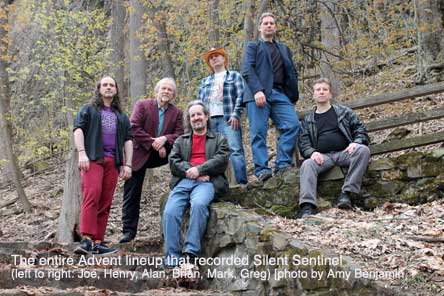 Although
Advent’s origins are over three decades old, we’ve only
had the opportunity to release three albums thus far, each approximately
nine years after the last—our self-titled debut on Mellow Records
in 1997, followed by Cantus Firmus in 2006 and Silent Sentinel
in 2015. Between the complexity of the music, the sizeable work/family
responsibilities we all have lived through, and challenges in keep
a full-band lineup together, it just seems to take a very long time
to get things done. In addition to our own albums, however, we’ve
also contributed recordings to a few tribute releases, two for Gentle
Giant and one of Procol Harum, a 4-CD theme-based compilation based
on Dante’s Inferno, a live track on a CD highlighting
performances from a festival where the band performed, and even recorded
a short track that was used as teaser music on the ESPN Classic network
a while back.
Although
Advent’s origins are over three decades old, we’ve only
had the opportunity to release three albums thus far, each approximately
nine years after the last—our self-titled debut on Mellow Records
in 1997, followed by Cantus Firmus in 2006 and Silent Sentinel
in 2015. Between the complexity of the music, the sizeable work/family
responsibilities we all have lived through, and challenges in keep
a full-band lineup together, it just seems to take a very long time
to get things done. In addition to our own albums, however, we’ve
also contributed recordings to a few tribute releases, two for Gentle
Giant and one of Procol Harum, a 4-CD theme-based compilation based
on Dante’s Inferno, a live track on a CD highlighting
performances from a festival where the band performed, and even recorded
a short track that was used as teaser music on the ESPN Classic network
a while back.
Our current lineup consists of Henry, Mark, and myself, along with
drummer Joe D’Andrea, who also sings very well and plays violin
in concert, and another guitarist/composer named Greg Katona—both
of whom are very established, long-term members that are truly integral
to what Advent has become. Unfortunately, we lost our most recent
bassist, Brian Mooney, in early 2016 and are still looking for a compatible
replacement. On the bright side, I’m enjoying playing more bass
in the studio, but it also means that we can’t perform live for
the time being. Hopefully this will change soon.
mwe3: How would you describe the music of Advent and how does
your new album Silent Sentinel combine and reflect the various
influences of its members? How does the chemistry of each member move
the sound of the entire band forward? Is there a group leader or founding
member and how many shows have you done live?
Alan Benjamin: I actually find it rather difficult to describe
most progressive music, with Advent proving harder to nail down than
average in this regard. As such, I tend to suggest a more generalized
reference to other artists that I hope may at least provide a rough
idea how our music sounds—something on the order of: “A
more modern and symphonic blend of Gentle Giant and early Genesis,
with the occasional Tubes-style funk and fusion flourish.” On
a more personal level, I’d say that Henry, as our primary composer,
brings a very deep classical influence and is also quite amazing with
his gift for writing program music—while additionally incorporating
a lot of counterpoint and polyphony, particularly of the sacred variety,
as well. In addition to his more ‘70s prog influence, Mark’s
writing tends to bring in a bit more of the pop- and fusion-oriented
aspects of what we do, including some of the funkiest bass lines!
 As a trained
classical guitarist, Greg injects a great sense of both traditional
and modern classical music into his compositional output, but also
tends a bit toward some of the flashier and more challenging guitar
work. And, while Joe hasn’t been writing in the band as of yet,
his dynamic, groovy, and versatile drumming and percussion work adds
a whole other layer of nuance to the end results—and he remains
very involved throughout a good portion of the creative process in
general. As an avid collector of progressive music from all over the
world, I’d have to say that there are a lot of influences that
seem to seep their way into what I contribute to the band. From a
compositional standpoint, Pekka Pohjola has probably had the most
foundational impact on my writing sensibilities, but I definitely
detect bits and pieces from many other sources as well.
As a trained
classical guitarist, Greg injects a great sense of both traditional
and modern classical music into his compositional output, but also
tends a bit toward some of the flashier and more challenging guitar
work. And, while Joe hasn’t been writing in the band as of yet,
his dynamic, groovy, and versatile drumming and percussion work adds
a whole other layer of nuance to the end results—and he remains
very involved throughout a good portion of the creative process in
general. As an avid collector of progressive music from all over the
world, I’d have to say that there are a lot of influences that
seem to seep their way into what I contribute to the band. From a
compositional standpoint, Pekka Pohjola has probably had the most
foundational impact on my writing sensibilities, but I definitely
detect bits and pieces from many other sources as well.
In terms of the chemistry between members, I’d say it’s
very symbiotic in nature—with each of us contributing in support
of what the others do best, extending to arrangement and production
as well. Fortunately, we almost always agree on what sounds best in
the end—and, in the extremely rare instances where an impasse
is reached, the primary composer of the piece or section, maintains
the right to make the final call. While Henry and I are technically
the band’s founding members—with Mark joining about six
months later and essentially becoming an additional founder in the
most meaningful sense—the band functions more like a creative
and collaborative democracy, with Joe and Greg being equally part
of the family in this respect.
Advent’s first full-band lineup came together in the early 1990s,
with original drummer Mike Carroll and Stick player Pete Filatov covering
the bass role. Unfortunately, due to personal circumstances, Pete
was forced to withdraw from the group just prior to our debut concert
performance, a live set scheduled at a music festival in Hillside,
New Jersey. As hard as we tried to solidify a permanent five- or six-piece
lineup for both studio and stage after that, the task proved too difficult
and we ended up recording a good part of Cantus Firmus with
just Henry, Mark, and myself on board—and were then very fortunate
to recruit drummer Drew Siciliano just in time to record on the album
as well. After that CD was released, we quickly found both Greg and
bassist Benjamin Rose, and played a series of shows that started at
the NJ Proghouse and went on to include performances at a few prog
festivals, ProgDay in North Carolina and MARPROG in Connecticut, followed
by the NJ Proghouse Homecoming Weekend festival with a newer lineup,
and individual shows in Philadelphia and NYC.
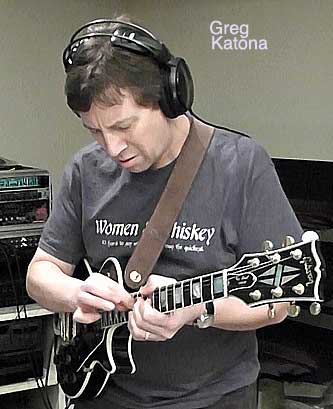 mwe3:
How does the mix of instrumental tracks and vocal tracks on Silent
Sentinel and your unique vocal harmonies set Advent apart from
other prog bands? What are your favorite tracks on Silent Sentinel
and tell us about the fifteen-minute CD closer “Romanitas”
and how it was created in the studio?
mwe3:
How does the mix of instrumental tracks and vocal tracks on Silent
Sentinel and your unique vocal harmonies set Advent apart from
other prog bands? What are your favorite tracks on Silent Sentinel
and tell us about the fifteen-minute CD closer “Romanitas”
and how it was created in the studio?
Alan Benjamin: I think our music is fairly eclectic and sophisticated
in one sense, but also melodic and accessible in another. On one hand,
we seem to approach a sort of “songwriter’s collective”
methodology, very much like Genesis did—but we think there is
also something of an “Advent sound” that’s developed
along the way and try to extend its boundaries in as sympathetic a
manner as possible. Also, the songwriting and arrangement are always
our top priority, and virtually everything else is simply in service
to these compositional aspects of the songs, and instrumentals—and,
in this particular sense, I think we differ from most other prog bands
who are more likely to center on virtuosity itself, although there’s
certainly nothing wrong with that, and/or extended soloing. Also,
there doesn’t seem to be many other prog bands who incorporate
such a strong cinematic/program music component in their work as Advent
does.
I really love the way the entire album came out and it’s very
hard for me to select favorite cuts. From the sheer sense of emotional
impact, though, I’d probably have to go with the title track—but
that may also be cheating since it’s the longest one as well.
Perhaps a bit self-focused in this regard, I’m also particularly
fond of the acoustic guitar duets and can’t adequately express
my appreciation for what an amazing writing and performing partner
Greg has been in this context.
Henry started talking about writing a big instrumental album closer
fairly early on in the process and, early on, shared the idea that
it would be something a bit different—and, if memory serves,
he came up with the title of “Romanitas” pretty quickly
as well. As more of the album’s music was written during the
track’s composition, it also afforded him the opportunity to
incorporate some related thematic material—and the coda additionally
inspired the album’s opening track, “In Illo Tempore”,
as well, although the connection may not be so obvious without digging
in a bit.
From a studio-construction standpoint, the “Romanitas” recording
was structured very much like the majority of the rest of the album’s
full-band tracks—keyboards/vocals recorded at Mark’s studio,
Brian’s bass recorded at his home, and everything else tracked
in my home studio. That being said, the choir recording for this track
was definitely a unique and intense experience. Henry wrote several
choir sections for “Romanitas” and tracking all of the corresponding
parts—in a single session—was definitely the most intense
day of recording we experienced during the entire album’s creation.
There were 11 singers in total and, in order to emulate the sound
of a much bigger choir, we used the approach of having everyone learn,
practice, and record each individual line in unison, participants
based on the line being in their respective vocal ranges, generally
doubling or tripling each of these group-sung lines on separate tracks,
with the same singers, to build out the corresponding sense of size.
Even though we pretty much spent the entire day and evening, I’m
still amazed that we were able to, barely, get all those choir tracks
finished in a single day—and it was also such a joy working with
all the great friends and family members who joined in and gave their
all.
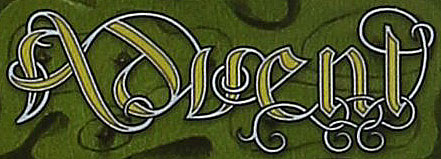 mwe3:
Where does Advent fit in the progressive rock world of 2017? What
do you make of the worldwide explosion of prog-rock over the past
decade? We were listening to it back in the 1970s, when it wasn’t
quite as respected as it is now, and of course we know that the founding
architects, a lot aren’t around anymore.
mwe3:
Where does Advent fit in the progressive rock world of 2017? What
do you make of the worldwide explosion of prog-rock over the past
decade? We were listening to it back in the 1970s, when it wasn’t
quite as respected as it is now, and of course we know that the founding
architects, a lot aren’t around anymore.
Alan Benjamin: Although there certainly has been a lot of activity
in the progressive rock realm over more recent years, I actually have
mixed emotions about the way things seem to be going in general. Without
trying to sound too cynical, I mostly see the prog world becoming
more like a microcosm of the old popular music industry, with many
of the most successful artists appealing to the more simple/familiar/accessible/commercial
side of things and compositions that don’t resonate (at least
with me) in terms of inspiration, creativity, or purpose. That being
said, I’m also very happy to have discovered some new acts over
the past decade or so that I think are truly inspiring—and am
starting to see a “new wave” of great progressive music
emerge that I’d consider somewhere between evolutionary and revolutionary.
Sadly, I do see artists of the former variety getting virtually all
the attention/exposure/sales while most of the new greats generally
seem to have significantly smaller niche followings—even from
the standpoint of the prog community as a whole.
As far as Advent is concerned, I see us creating more of a bridge
between my favorite classic prog music of the 1970s, backward to its
formative classical/European folk roots, and also forward to the contemporary—and
in a way that’s quite different from what I’ve heard anyone
else doing. I’d also say that this makes Advent sort of an odd
duck in a sense—especially from the standpoint of potential media
interest. I believe this insight may also suggest why Pandora rejected
Silent Sentinel, by the way, as it’s just not that easy
to categorize or align the scope of what we do as compared to other
progressive bands.
mwe3: Tell us about your guitars and something about your background
as a guitarist, for example when you started playing guitars, do you
still practice and what, and also your current and favorite past guitars,
amps and favorite effects and pedals? Do you follow the vast upsurge
in musical equipment technology of the 21st century?
Alan Benjamin: I’ve got quite a few guitars, but tended
to favor my fairly new Strat, an American Deluxe, for a lot of the
recording work on Silent Sentinel. I also busted out an old
Charvel Model 6 for several tracks on the album, with a 1970s Les
Paul and my favorite old BC Rich Mockingbird Supreme also leveraged
in various spots. I can’t remember for sure, but there may also
be a Godin xtSA on the first part of “Voices from California”
too, originally tracked for a working demo but retained for the final
recording. For acoustics, I used a factory-second Martin HD-2832,
an old Ovation model 1115 12-string, and a Yamaha CG-100A for the
classical guitar tracks.
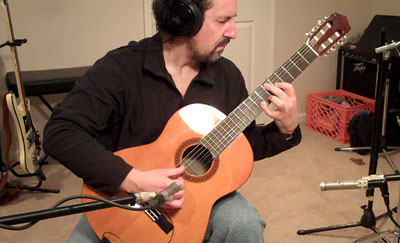 My dad
had an old Vega f-hole acoustic at home when I was growing up—and,
while I was much more focused on learning piano and violin in my early
youth, I did pick up some guitar basics by reading chord charts in
the old songbooks that were laying around on his instrument. After
getting into rock music at boarding school, my mom bought me a fairly
modest Conn acoustic—and, not too long afterward, my dad took
me down to 48th Street to get my first electric guitar, an Aria copy
of a Les Paul “Black Beauty”, and amp. I took a few guitar
lessons in the 1970s, first at Guitar Study Center in NYC and then
with a jazz teacher whose name I forget outside Philly, but remained
predominantly self-taught until studying with the amazing fusion guitarist/teacher
Glenn Alexander in the late 1980s for about a year. I definitely try
to play at least a little every day, but generally don’t practice
in terms of exercises—however sometimes write music with the
intent of it strengthening at least one critical aspect of my playing.
My dad
had an old Vega f-hole acoustic at home when I was growing up—and,
while I was much more focused on learning piano and violin in my early
youth, I did pick up some guitar basics by reading chord charts in
the old songbooks that were laying around on his instrument. After
getting into rock music at boarding school, my mom bought me a fairly
modest Conn acoustic—and, not too long afterward, my dad took
me down to 48th Street to get my first electric guitar, an Aria copy
of a Les Paul “Black Beauty”, and amp. I took a few guitar
lessons in the 1970s, first at Guitar Study Center in NYC and then
with a jazz teacher whose name I forget outside Philly, but remained
predominantly self-taught until studying with the amazing fusion guitarist/teacher
Glenn Alexander in the late 1980s for about a year. I definitely try
to play at least a little every day, but generally don’t practice
in terms of exercises—however sometimes write music with the
intent of it strengthening at least one critical aspect of my playing.
Not generally being a big fan of using individual stomp-box pedals,
I’ve always tried to find more integrated solutions that provide
everything I need in a single place—and with the ability to execute
complete sound/timbre changes with a minimum of acrobatic footwork.
I’ve also toyed with modelers a bit and have a tendency to go
back and forth between the corresponding tonal resources I’ve
gathered, depending on what I hear fitting best into the material/situation.
For the album, most of the electric guitars were either recorded direct
and processed through one of two amp-simulation plugins—Overloud’s
TH2 and Free Amp by Fretted Synth Audio, the latter generally for
cleaner sounds or played live through my Fender Hot Rod DeVille 410
amp front-ended by an Ernie Ball volume pedal and a Vox ToneLab SE
tube-driven modeler/effects board.
While I had also been using this volume pedal-ToneLab-DeVille configuration
for Advent’s more recent concert performances, I began to realize
that it was probably time for an update about a year ago and ended
up purchasing a Fractal Audio AX8 modeler/multi-effects floor unit
in the spring. Since this device models the entire signal chain—including
amp cabinets/speakers being recorded by a microphone—and is optimized
for playback through FRFR (Full Range Flat Response) speakers instead
of a guitar amp, it’s been a pretty big adjustment. I’m
still doing a lot of tweaking, but think the AX8 will likely be used
for virtually all my future electric guitar recording and live performance
(direct into PA) from this point forward.
mwe3: What is the current status of Advent and what other ideas
or songwriting and recording lays ahead for its members in the future?
Are you and the other members always writing music? Where would you
and the band like to go next with Advent, musically and stylistically?
 Alan Benjamin:
Our original plan was to put together as much of a tour as possible
in support of the album, but Brian’s departure forced us to put
our live show on hold. After months of searching for a suitable replacement
unsuccessfully, the band decided to work on new material once again
instead—and we’ve been working on what is likely to be a
stand-alone single that we hope to finish up and release over the
next few months. What happens after that will most likely depend on
the timing of when (or if) we find a new bassist.
Alan Benjamin:
Our original plan was to put together as much of a tour as possible
in support of the album, but Brian’s departure forced us to put
our live show on hold. After months of searching for a suitable replacement
unsuccessfully, the band decided to work on new material once again
instead—and we’ve been working on what is likely to be a
stand-alone single that we hope to finish up and release over the
next few months. What happens after that will most likely depend on
the timing of when (or if) we find a new bassist.
I think each of us tends to write on different schedules, with Henry
being the most likely to continually have something in the works at
any given time. While I’d love to compose as much more new music
as possible, my life has become quite hectic and I tend to be most
productive when forced to meet some sort of deadline, self imposed
or otherwise. In terms of where we go next as a band, I think it’s
a bit too early to tell—as we generally like to keep our options
open to whatever muse arises and be able to follow a natural path
from there.
On a related note, there have also been a few significant personal
issues in the lives of several Advent members that have cropped up
since the release of Silent Sentinel. With this in mind, it’s
really hard to be able to predict when we’ll know much more about
the future, but I’m optimistic that you’ll see a new burst
of activity from the band once we’ve made it past these more
recent difficulties... and, fortunately, I am definitely starting
to see the light at the end of the tunnel in this regard.



